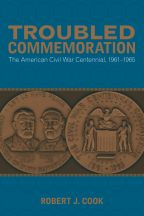
320 pages / 6.00 x 9.00 inches / no illustrations
In 1957, Congress voted to set up the United States Civil War Centennial Commission. A federally funded agency within the Department of the Interior, the commission's charge was to oversee preparations to commemorate the one-hundredth anniversary of the central event in the Republic's history. Politicians hoped that a formal program of activities to mark the centennial of the Civil War would both bolster American patriotism at the height of the cold war and increase tourism in the South. Almost overnight, however, the patriotic pageant that organizers envisioned was transformed into a struggle over the historical memory of the Civil War and the injustices of racism. In Troubled Commemoration, Robert J. Cook recounts the planning, organization, and ultimate failure of this controversial event and reveals how the broad-based public history extravaganza was derailed by its appearance during the decisive phase of the civil rights movement.
Robert J. Cook is a professor of American history at the University of Sussex in Britain. His book, Troubled Commemoration: The American Civil War Centennial, 1961-1965, was a finalist for the Lincoln Prize.
“Worthwhile and engaging reading for anyone concerned with cultural politics of the cold war and the civil rights movement.”—Journal of Southern History
“Based on meticulous and judicious use of official records, it succeeds remarkably well, gracefully revealing the formative influences of the Cold War and especially civil rights on the way Americans marked the hundredth anniversary of their bloodiest war.”—North Carolina Historical Review
“Cook’s account . . . is both thorough and illuminating.”—Journal of American History
“With the sesquicentennial of the Civil War fast-approaching, Robert J. Cook's book is a must-read, if planners are to implement a less-troubled commemoration.”—Georgia Historical Quarterly
“To the extent that it might help the country do better this time around, Cook’s book is a contribution not only to scholarship but also to a broader public encounter with history.”—Reviews in American History
Found an Error? Tell us about it.